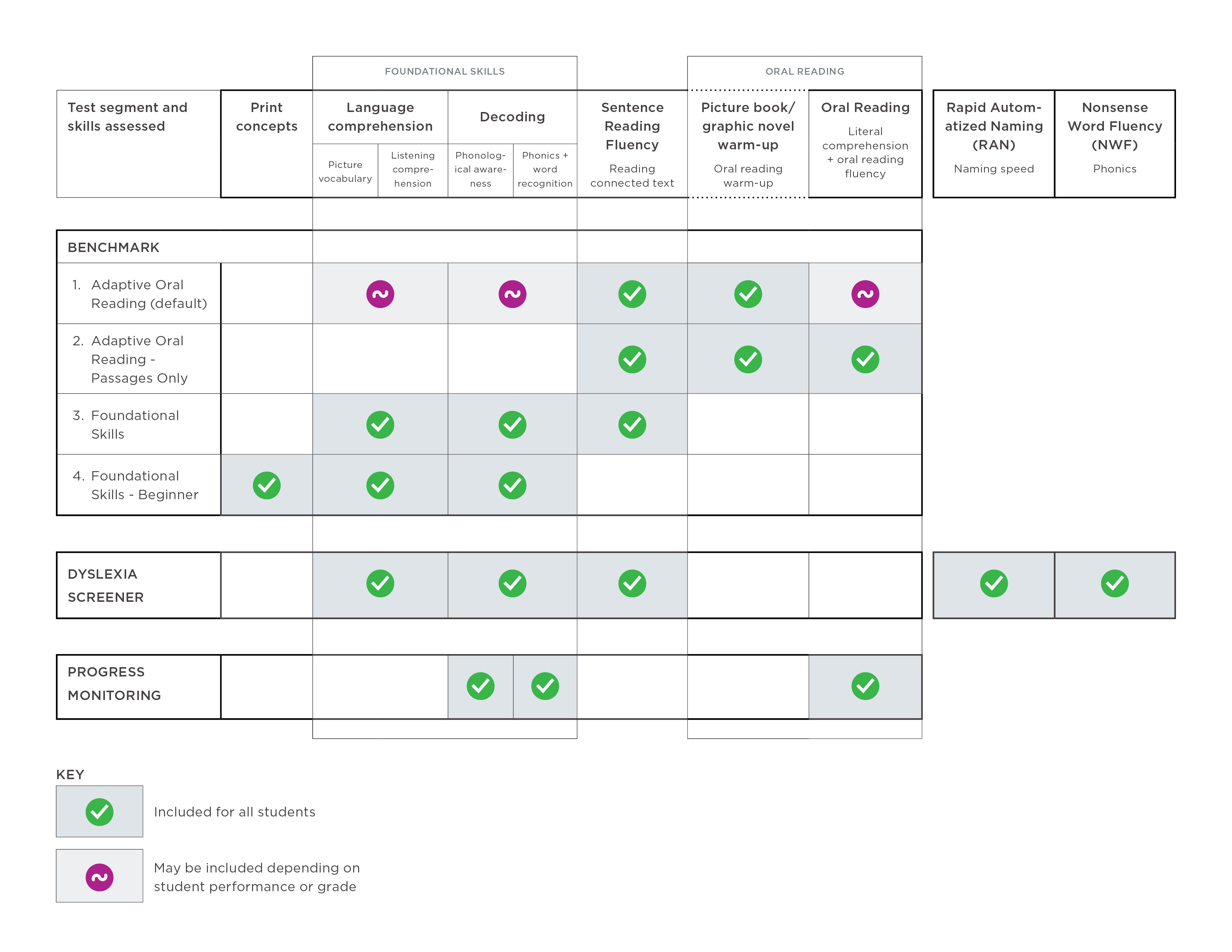
More help:
NWEA Support
Have an idea?
Share it!
Assessment Content and Test Types
Introduction
MAP Reading Fluency can be used for three main purposes:
-
Gathering interim benchmark data about foundational or oral reading skills as well as universal screening using the Benchmark test
-
Progress Monitoring throughout a term in Foundational Skills (specifically in the areas or domains of Phonological Awareness and Phonics & Word Recognition) and in Oral Reading
-
Screening students for possible risk factors for dyslexia or other reading difficulties using the Dyslexia Screener
Therefore, MAP Reading Fluency has three main test types. The table below, MAP Reading Fluency Test Types, will fill you in on the basic facts about each one. Select the links in the table that interest you or use the Help Center navigation to learn more.
| MAP Reading Fluency Test Types | ||||
|---|---|---|---|---|
| 1. Benchmark Tests | 2. Progress Monitoring | |||
| Foundational Skills |
Oral Reading |
|||
| Recommended grade levels | Pre-K through 5 | K–5 | Grade 1 (spring only) and grades 2–5 | Available for K–3 only |
| Test content | Oral reading fluency, literal comprehension, and/or foundational reading skills, depending on test subtype assigned; universal screening for possible reading difficulty* | Phonological Awareness and/or Phonics & Word Recognition | Oral reading fluency and literal comprehension | Foundational reading skills, Rapid Automatized Naming (RAN), and Nonsense Word Fluency (NWF); identifies students with possible risk factors for dyslexia or other reading difficulties |
| Administration types | Onsite and remote | |||
| Frequency | 3 times per year | Multiple times per term | Multiple times per term | Up to 3 times per year |
| Test time | About 20 minutes to assess an entire class simultaneously | 5–7 minutes for either test | 5–10 minutes | About 20 minutes to assess an entire class simultaneously |
| Accessibility | Audio instruction, color contrast adjustment, and magnification | |||
| Setting Up for Testing | Devices and headsets for each student | |||
| Languages | English and Spanish* | English | English | English |
*Due to the differences between the Spanish and English languages, some of the tested skills will be different on the Spanish test, but both tests will accurately assess reading ability. Universal screening is available in all English Benchmark tests except for the Foundational Skills – Beginner test subtype. Universal screener outcomes are not available for Spanish MAP Reading Fluency at this time.
Choosing the right test assignment
If you’re unsure which test type to assign, you may find the following references helpful.
Test Segments and Skills Assessed in Each Test Type

MAP Reading Fluency Administration Guidance
For recommendations about which test types are appropriate for your students, refer to the MAP Reading Fluency Administration Guidance Document. It provides a summary of the Benchmark test subtypes, Progress Monitoring test, and Dyslexia Screener to help you determine which of the tests to assign. The document also provides guidance on using MAP Reading Fluency and MAP Growth together.
Research Tests
Research tests are optional tests that collect data to improve MAP Reading Fluency. They are intended for MAP Reading Fluency partners who are participating in an NWEA research program. For more information, contact your Account Manager.
Student experience
The student experience will vary depending on which test students are assigned. To see what students will see in each test, refer to each test type topic:
Test Construction: MAP Reading Fluency Technical Report
For a deeper dive into psychometric and test construction information, please download the MAP Reading Fluency Technical report.
For test design and specifications for the Spanish assessment, please download the Spanish MAP Reading Fluency Content Guide.